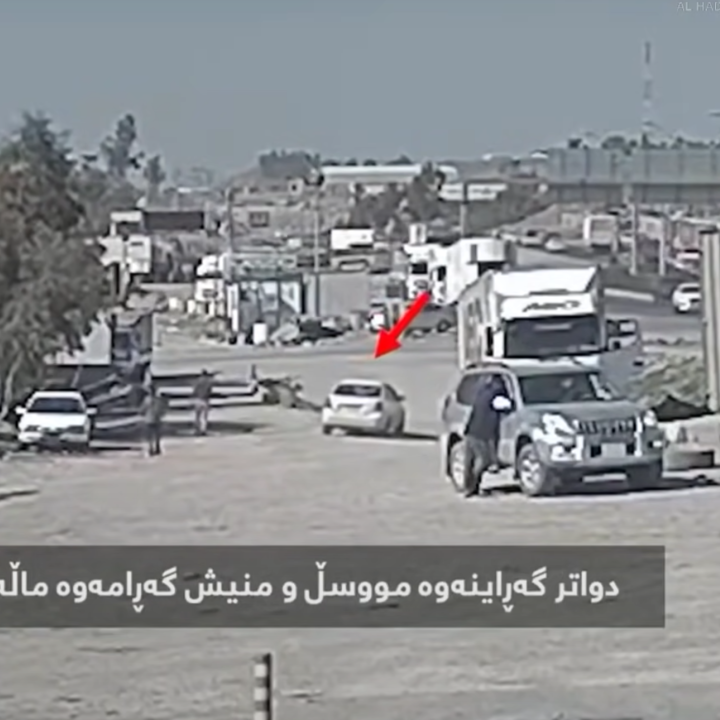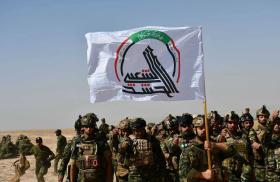
The Erbil Rocket Cell: Insights from Haidar Hamza al-Bayati's Confession

The video offers potentially significant insights into the detainee and his description of being recruited by Kataib Sayyid al-Shuhada.
On March 3, the Saudi television channel Al-Hadath and other media outlets broadcast a four-minute clip from the video confession of Haidar Hamza Abbas Mustafa al-Bayati. Originally released by authorities in Iraq's Kurdistan Region, the footage shows Bayati describing his role in the February 15, 2021, rocket attack in Erbil.
While it is impossible to vouch for the accuracy of the testimony, the detailed account provides some interesting points, if proven to be valid.
The attacker. Judging by his name, Bayati is a Turkmen from the southern Nineveh Plains. His testimony suggests he was born in al-Hamdaniya village in the district of Qaradagh, equidistant between Mosul and Erbil (36°10'0.86"N 43°29'3.59"E) and about three miles west of the Kurdistan Control Line on the Little Zab River delta.
Bayati claims to have been recruited in November 2020 (just over a month after a previous rocket attack on Erbil from the Nineveh Plains on September 30, 2020). Details of his confession suggest he was a resident of Khabat, inside Kurdistan, who visited Mosul and the Nineveh Plains, which is where he appears to have “got to know” (in his words) a man who he describes as hailing from the militia “Kataib Sayyid al-Shuhada” (KSS).
One standout feature of the testimony is the thinness of connections to KSS. The initial recruiter may have self-described as KSS, but other members are not further identified as KSS, and Bayati may have been in a poor position to judge who he was recruited by or later operating alongside. Although Iraq's fasail (armed groups) share many operating areas, the Shabak militias of the eastern Nineveh Plains have been strongly associated with Asaib Ahl al-Haq (AAH) bases at Bartella, while Shia Turkmens have been recruited by both AAH and groups like Kataib Hezbollah, the Badr Organization, and KSS.
Bayati’s value to the attack cell was undoubtedly his residency in the Kurdistan Region. He assisted two other men in buying an Erbil-registered Kia truck, which would prove vital in transiting back and forth across the Kurdistan Control Line. Shortly before the attack, Bayati helped one other attacker get Kurdistan Region residency (possibly as a resident sponsor).
The tradecraft of the attack cell included some interesting aspects. The operation was nearly three months in the making. Operational security was good: Bayati and two others wore COVID masks and baseball caps to conceal their identities from CCTV as they purchased the Kia. The plot unfolded patiently, with the Kia likely setting a pattern of activity moving back and forth from the Nineveh Plains to Erbil, over a period of two months. The cell kept the Kia on “the Bardarash Road” after it was modified and loaded with hidden rocket racks on a prior trip to Mosul.
Execution of the attack was less effective. They set up the rockets and then left, seemingly initiating the attack by timer or some other remote means. They drove away rapidly, even nervously, at 9:16 p.m. The attack cell escaped immediately to Mosul and were likely exiting the Kurdistan Control Line as the rockets fired around 9:33 p.m. Unbeknownst to them, the launcher began to melt its fixtures as successive rockets fired, spraying the rockets in a wide arc across the city.
Most notably, Bayati appears to never have been fully trusted by the cell. He only learned of the attack date on the day of the strike. Pre-attack reconnaissance took place at the Alwa market just a half-day before the incident. During the attack, Bayati was sent away to act as the getaway driver. After the attack, he appears to have returned to his life in Khabat, where he was immediately captured. He was not exfiltrated by the militia or relocated, as is usually the case with valuable and trusted KH or KSS members. He appears to have been treated as a disposable local contact. It is possible he never knew exactly who he was working with or for.
Alongside other evidence, such as the strong involvement of AAH-related channels in previewing and publicizing the attack, the details of the Erbil rocket case may also suggest that the claim of KSS involvement was not necessarily accurate, or perhaps the group was only involved temporarily.







